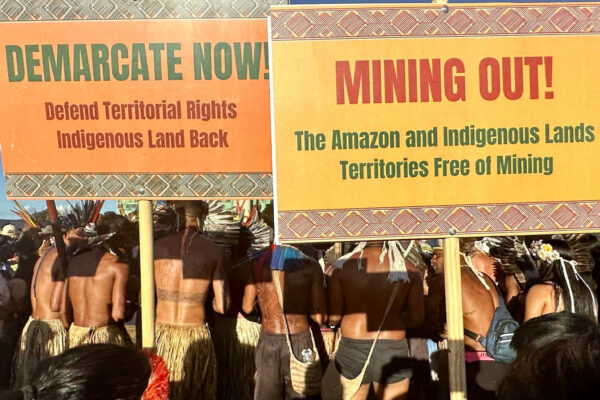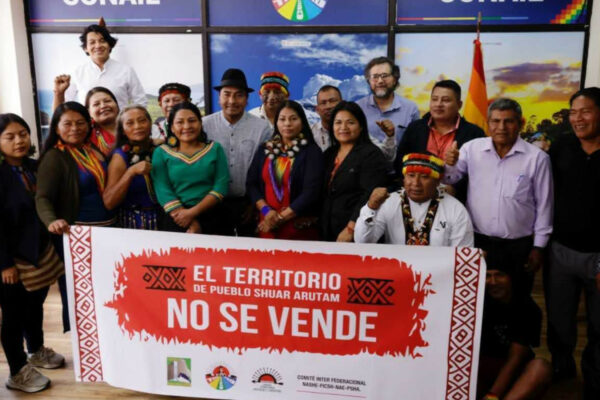Quito, Ecuador – Ecuadorean security forces battled
protesters Thursday but the standoff failed to disrupt
the work of trade ministers trying to hammer out a
regional trade pact.
An estimated 10,000 anti-free trade protesters were
not the only voices clamoring for an audience in Quito
as trade officials from 34 nations met as part of
negotiations for a Free Trade Area of the Americas.
Representatives of a business forum, of civil society
groups and the Hemispheric Social Alliance handed
their recommendations over to the government officials
Thursday, just one day before the minister was to
issue a Declaration of Quito.
Police and army troops, some with dogs, cordoned off
blocks of the city surrounding the Marriott Hotel,
where the trade ministers were meeting under tight
security. Troops stood by while protesters from Latin
America and the United States waved banners and danced
on armored vehicles. They then fired tear gas on
protesters, dispersing them.
“The FTAA is not seeking a true free market, but the
opening up of Latin American markets for the United
States,” said Juan Jine, a leader of the Guatemalan
Coordinator of Indigenous and Rural People.
Ensconced behind several lines of police in the
Marriott, trade ministers made no reference to the
street protests, which included farmers who had
marched for several days from Colombia and Peru. But
there were other shadows hanging over the talks, which
are showing the strain of carrying out trade
negotiations over tariffs and investment rules in a
world where trade agreements have become politicized.
Experts and observers had few expectations of big
announcements or breakthroughs at the Quito meeting,
as the worsening economic problems of the region
further dampened the atmosphere.
Even business leaders – boosters of the process from
the moment the goal of negotiating a free trade area
from Canada to Chile was floated – were soured on
some of the proposals. With new presidents set to take
office in Brazil and Ecuador, Argentina’s economy in
collapse and Venezuela’s government led by President
Hugo Chavez calling for a slowdown in the pace of
talks, at least four key players in the talks could
not guarantee that future governments would keep past
commitments.
Business leaders from different countries clashed at
the Business Forum of the Americas and many questioned
whether their recommendations were being heard. “This
process is exhausted,” said Colombian lawyer Gabriel
Ibarra, who had worked on a panel about competitive
policy. “What is the point of coming here if no one
listens to us?”
No one expects trade talks to run smoothly, but there
were signs of little and big strains.
Guayaquil industrial leaders refused to join the
Ecuadorean business coalition because they rejected
having a joint position for Andean countries. After
the Andean countries of Boliva, Colombia, Ecuador,
Peru and Venezuela had agreed in principal to
negotiate tariff reductions as a block, Colombia
backed down and agreed to lower tariff rates favored
by the United States.
But by far the biggest disagreement was over the issue
of U.S. agricultural subsidies. For Brazil, which runs
a trade deficit in manufacturing and machinery, the
only way to increase exports is through agriculture –
exporting citrus and soy to the United States.
But representatives from nearly all the countries
launched into heated discussions of U.S. farm
subsidies.
Asked what would happen if there was no agreement on
this thorny agricultural issue, Roberto Nesto,
president of Peru’s National Society of Industries,
warned: “Then we would have a major problem.”
Some participants believe the distance between the
sides is so great that the sensitive agricultural
issue will be moved to the World Trade Organization,
where trade negotiators are trying to work out a
simultaneous reduction in European, Japanese and U.S.
farm subsidies.
This is not a solution favored by the Latin American
countries, but U.S. Trade Representative Robert
Zoellick has already insisted that if the FTAA is
stalled, the United States will push forward with
bilateral talks, including ones with Chile, Central
America and even bilateral discussions with Argentina.
The trade agreement is not only about lowering import
duties over a five-, 10- or even 15-year period.
Patterned after the North American Free Trade
Agreement, the FTAA would also establish rules
protecting foreign investment, privatize many
government services and do away with local laws about
government purchases.
In an attempt to highlight momentum in the midst of
considerable skepticism, Zoellick called a news
conference to announce a Hemispheric Technical
Assistance program to help small countries prepare for
opening their borders to imports.
But the program, with U.S. funding to increase from
$100 million to $140 million next year, falls far
short of more ambitious programs that Latin American
leaders are demanding to fight poverty.













